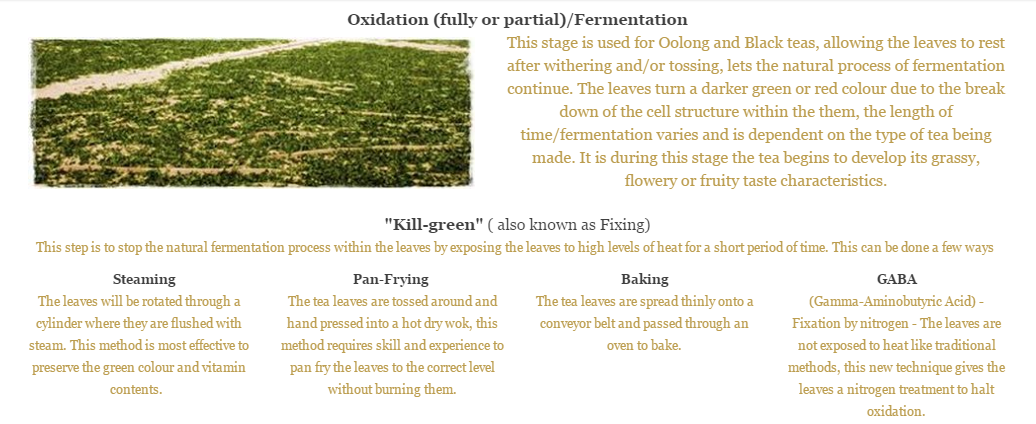From Leaf To Cup

Planting and Growing

The evergreen tea plant 'Camellia Sinensis' are propagated from seeds or cuttings, taking about three years before a new plant is ready for harvesting. The tea plant would grow to 16m high but are generally cultivated to waist height for easy picking, the pruned bush also produces more new and tender shoots which result in a greater yield and higher quality of tea.
Each type of tea has a different taste, aroma and appearance. The categories are distinguished by the various stages of processing and degrees of oxidation the leaves go through.

Plucking
Leaves and buds are usually picked twice a year, and done by hand for higher grade teas, the highest grade of white tea is produced from only the new buds, and lower grades of white tea are made from buds and the youngest two leaves. The machine picked teas tend have damaged leaves which reduce the quality.
Leaves and buds are usually picked twice a year, and done by hand for higher grade teas, the highest grade of white tea is produced from only the new buds, and lower grades of white tea are made from buds and the youngest two leaves. The machine picked teas tend have damaged leaves which reduce the quality.

Withering/Wilting
The leaves begin to wilt soon after picking, to assist they are spread out either inside or outside in the sun. Drawing moisture to the surface to evaporate, they often lose up to a quarter of their weight in water during this process. It also helps to soften the leaves and reduce the grassy taste, beginning the natural enzymatic fermentation process.
The leaves begin to wilt soon after picking, to assist they are spread out either inside or outside in the sun. Drawing moisture to the surface to evaporate, they often lose up to a quarter of their weight in water during this process. It also helps to soften the leaves and reduce the grassy taste, beginning the natural enzymatic fermentation process.
Tossing/Bruising
(also known as 'turnover', 'disruption' or 'leaf maceration')
Generally done with the aid of a machine, this breaks the leaves down further, to improving oxidation while mixing chemical elements from the stems with the leaves, removing bitterness and helping to balance the flavour.
(also known as 'turnover', 'disruption' or 'leaf maceration')
Generally done with the aid of a machine, this breaks the leaves down further, to improving oxidation while mixing chemical elements from the stems with the leaves, removing bitterness and helping to balance the flavour.

